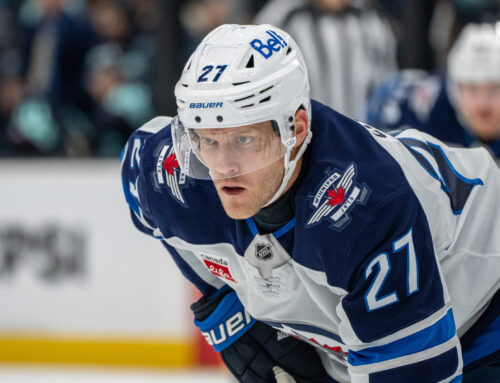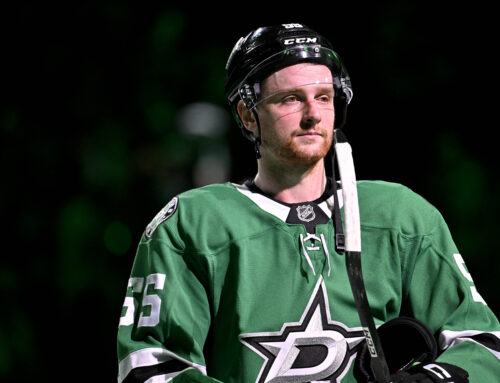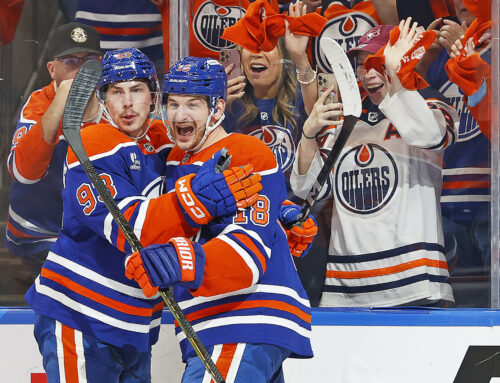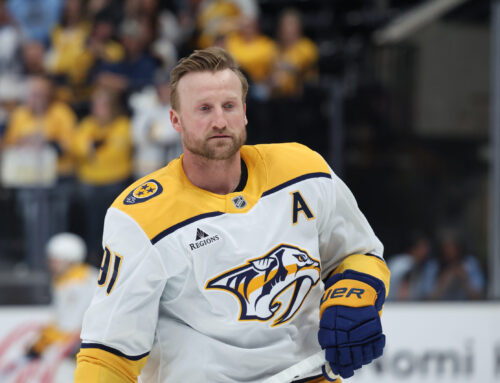I'm never sure when to unload an ageing player on my roster and in looking over the past five seasons, skaters over the age of 30 are still pretty well represented in the scoring leaders of the NHL but it is sporadic because of the risk of injury and decline in ability increase with age. Only two players appear more than once in the top ten scoring that were over 30 in the five years below; Sidney Crosby and Blake Wheeler. Here are the breakdowns over the past five seasons for representation in the top 30 and top 10 scorers in the NHL:
2015-16
10 skaters in the top 30; three skaters in the top 10.
Joe Thornton 4th overall with 82 points at 37 years old
Joe Pavelski 6th overall with 78 points at 32 years old
Blake Wheeler 7th overall with 78 points at 30 years old
2016-17
11 skaters in the top 30; two skaters in the top 10.
Sidney Crosby 2nd overall with 89 points at 30 years old
Brent Burns 9th overall with 76 points at 32 years old
2017-18
10 skaters in top 30; six skaters in top 10.
Claude Giroux 2nd overall with 101 points at 30 years old
Evgeni Malkin 4th overall with 98 points at 32 years old
Anze Kopitar at 7th overall with 92 points at 31 years old
Phil Kessel at 8th overall with 92 points at 31 years old
Blake Wheeler at 9th overall with 91 points at 32 years old
Sidney Crosby at 10th overall with 89 points at 31 years old
2018-19
10 skaters in the top 30; three skaters in the top 10.
Patrick Kane 3rd overall with 110 points at 31 years old
Brad Marchand 5th overall with 100 points at 31 years old
Sidney Crosby 6th overall with 100 points at 32 years old
2019-20
10 skaters in the top 30; two skaters in the top 10.
Brad Marchand 6th overall with 87 points at 32 years old
Patrick Kane 8th overall with 84 points at 32 years old
What will 2021 bring for the older crowd and how will the extended break affect the players?
I'm going to focus on the western skaters that were in the top 30 this past season and look at a few other players that warrant a closer look to see if there are any signs of slowing down for 2021.
Patrick Kane (32) – I would feel comfortable with Kane's age and production holding steady for at least the next two seasons and then be a little wary when he enters into the last year of his contract in 2022-23 at the age of 34. Kane is a perimeter player so should be able to produce as long as his skating abilities are even close to where they are currently. His shots on goal, ice time and shooting percentage are all very consistent. His issue will be when his offence starts to decline to a level that won't offset his defensive deficiencies and that is around 60-70 points for a player like him. He is still one of the safest players on this list to have on your roster for the next three years in a points only pool.
Max Pacioretty (32) – Pacioretty had six straight seasons between 2011-12 and 2016-17 where he averaged around 0.80 pts/game along with five seasons of 30 goals or more. He battled through some injuries the two seasons after that period and only averaged about 0.60 pts/game while capping out at 22 goals. Last season at 32 years old, he had his most productive season with 65 points in 71 games for 0.93 pts/game with 32 goals. He is in an ideal situation in Vegas for the next three seasons and should be able to keep his 30 goals and 0.80 pts/game for the next two seasons at least. The concern with Pacioretty is that he plays physical (averages over 100 hits/year) and has battled injuries in two of the last three seasons. Not a great recipe for an older player.
Roman Josi (30) – Josi is locked in with Nashville until the end of 2027-28 and will be 37 years old when the deal expires. Defensemen typically can play at a higher level than forwards into their mid and late 30s (see Mark Giordano in 2018-19 at the age of 35) and Josi fits the bill perfectly to continue that trend. He is not an overly physical player and while his 77 point pace from last year might be stretching it a little there is no reason to doubt that he will be a 50-point player for the next four or five seasons.
Anze Kopitar (33) – There are some signs that Kopitar is already slowing down a little and that is not a signal for a fantasy owner to keep him on your roster for much longer. His shots per game have decreased to the point where he needs to shoot well over 15 percent to have a chance at 20 goals. The Kings’ lack of talent at center ice has forced Kopitar to play much more defensively over the past three seasons and as a result, his zone starts have tilted to his own end considerably, which makes it more difficult for an ageing forward to generate chances off the rush. He has four more years on his $10 million AAV contract with the Kings but he will more than likely struggle to have more than one more season of 60 plus points during that period.
Nazem Kadri (30) – Kadri is under contract for two more seasons in Colorado and will probably look to be one of the many overpaid beneficiaries of July 1st when his contract expires. Two years is the period that I would look for him to maintain his current production, but the key for Kadri like a few other players battling injuries is keeping on the ice. Notwithstanding his excellent postseason, his regular-season production of 19 goals and 36 points in 51 games shows every indication of being an overachievement if you look at his elevated PDO of 105.6 and his unsustainable 5 on 5 shooting percentage of 11.5. Kadri's overly combative style over his career won't be conducive to a forward playing healthy well into their 30s.
Jamie Benn (31) – I've written about Benn a few times over the past year and a bit and to me there is no doubt he is declining. I don't think he will be as low as last season at 0.57 pts/game but his days around a point per game are probably done. The Stars are giving him less ice time in the regular season to keep him fresher come playoff time and his time on the first unit of the powerplay is decreasing as well. His IPP (Individual point percentage) appears to have settled in around 60 compared to earlier in his career where it was in the high 60s or low 70s and this suggests he is not carrying the play as much anymore. He has five more years on his $9.5 million AAV contract in Dallas.
Drew Doughty (31) – Doughty is signed with the Kings at $11 million AAV until 2026-27 which is problematic. Unlike Roman Josi, Doughty has not been at the top of his game for the past two seasons and there is a real worry that he will ever bounce back to the 50-60 point player he was from three seasons ago. The biggest reason I see is that three seasons ago, Doughty had help on the blue line and wasn't forced to be a shutdown defender, where he has struggled the past two seasons. The Kings don't appear to have help on the way, so there is little reason to think short-term that Doughty will get back to a point where he is benefited with around 55 percent of OZ starts as compared to the 48 or 49 in recent years. There is also every indication that his 60-point season was an anomaly and that 40-45 points is his true wheelhouse.
Matt Duchene (30) – There is a perception that Duchene is an elite player that is underperforming, but I'm starting to believe that he is closer to an average, overpaid player that has had a few good seasons. He is under contract in Nashville for six more seasons at $8 million AAV and is coming off of 13 goals and 42 points in 66 games last season. That was good for 0.64 pts/game but that isn't that far off his career average of around 0.77 pts/game. He is not a physical player by any means so there isn't a fear that he will regress quickly in his production. We just need to adjust our expectations perhaps on what a good season for him is. He is a fairly sheltered forward (63.1 percent OZ starts last season) who has never been that responsible defensively. Own him for the next few seasons but don't expect him to be a 70-point player, but don't be surprised if teases you with one productive season.
Erik Karlsson (30) – It's a testament to how good Karlsson was from 2011-12 to 2016-17 that we can look at his past two seasons of 0.85 pts/game (45 pts) and 0.71 pts/game (40 pts) and label them huge disappointments. We can be fairly assured that his 20 goal seasons are behind him, and he has dialled back his hits and blocked shots as well to increase his odds of playing more games (which haven't helped much). He has seven more seasons under contract in San Jose at $11.5 million AAV and that is where his past two seasons are disastrous for fantasy owners in salary cap leagues. As long as Karlsson can lace up the skates and get on the ice, he is better than 95% of defensemen in this league, but we've seen him at 99.99% and it's difficult to give that up. He is still a player that should have no problem getting 50-60 points in 70 games, but playing is easier said than done. I don't see how is still playing towards the end of this contract at 37-years old.
Logan Couture (31) – Couture is a little like Matt Duchene as I have this perception that he is a much better producer than he actually is. His career-high is 70 points but typically he manages about 200 shots on goal each season and needs to shoot around 15-16 percent to reach 30 goals which doesn't leave him much margin for error or any room to improve. He is capped at 30 goals and is a consistent 60-point player but for how much longer is the big question? His play at even strength is still quite strong but he managed to not score a goal while on the power play last year, even though he was on the first unit and did produce nine points in his 52 games last year. He has seven years remaining in San Jose at $8 million AAV.
Ryan O'Reilly (will turn 30 this season) – O'Reilly is still at the top of his game and has three years remaining on his $7.5 million AAV contract in St. Louis. One category to monitor for him is his shots on goal which came down quite a bit last season to 118 in 71 games from over 230 in the prior two seasons. This resulted in only 12 goals for O'Reilly compared to 28 and 24 goals the two years prior. On the power play two seasons ago he had 15 goals while last season he had only two, which might be attributed to the absence of Vladimir Tarasenko on the first unit and forcing O'Reilly into a different spot on the unit. This doesn't account for the overall decline in shots. O'Reilly plays a hard game but not a physical game, so he should be able to maintain his current level for the duration of his contract.
Jonathan Marchessault (will turn 30 in December 2020) – Marchessault has four years remaining at the bargain price of $5 million AAV in Vegas and has been very consistent over the past three seasons. He has been a shot machine that has generated almost 3.5 shots per game with a shooting percentage between nine and ten over the past three seasons. His hit totals have been very close to 100 in each of the past three years. He seems to be a lock for 25-30 goals over an 82 game schedule and can produce 35-45 assists as well. One aspect of Marchessault's game that is a small worry is that he didn't get a full-time role and emerge in the league until he was 26-years old. As a smaller player, if he loses a step and a bit of his compete level, his production and deployment will disappear fairly quickly.
Another factor for older players is if they have a blue-chip prospect breathing down their necks to take some of their playing time away it can make the decline that much steeper. The players listed above should all be ok in that regard for at least the next two or three seasons with the current prospects each team has.
Thanks for reading and let me know if you want me to focus on any players or topics by messaging me below or following me on Twitter @gampbler15.





 UTA
UTA PHI
PHI VGK
VGK EDM
EDM NYI
NYI VAN
VAN L.A
L.A ANA
ANA NYR
NYR
